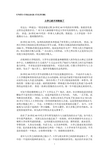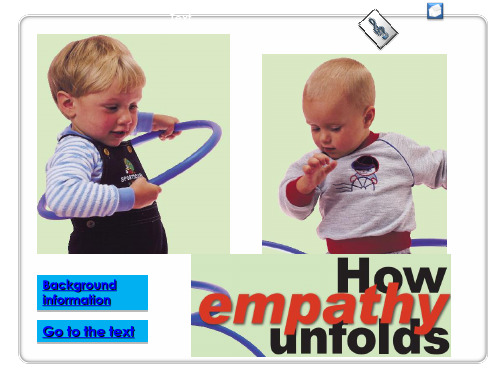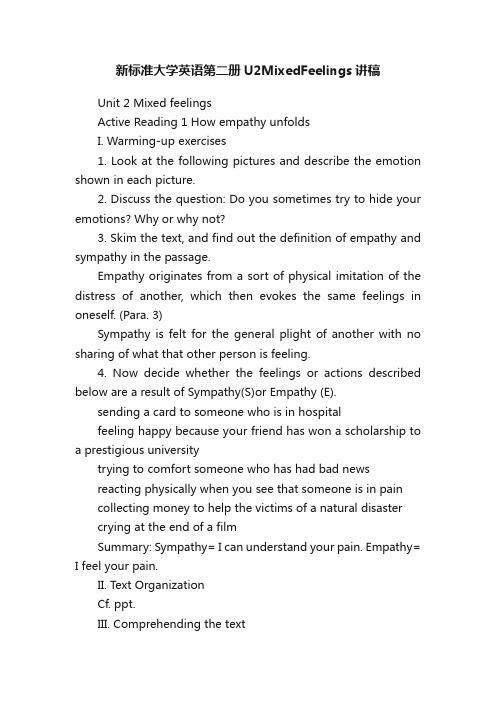新标准大学英语第二册U2 Mixed Feelings讲稿
新标准大学英语(第二版)综合教程2 Unit 2 B篇练习答案及课文翻译(ppt课件)

学习交流课件
9
Text
Background information
➢ Emotional Intelligence is a book written by Daniel Goleman and published in 1995. The theory of emotional quotient (EQ) was based on earlier work done by other psychologists in the 1970s and 1980s – a quotient is the number that is the result of dividing one number by another, so EQ is a score for behaviour involving emotions. The EQ concept claims that emotional intelligence is as important as the traditionally recognized intellectual intelligence. A high IQ (Intelligence Quotient) does not represent all the elements for a successful career or life.
Everyone knows that high IQ is no guarantee of success, happiness, or virtue, but until Emotional Intelligence, we could only guess why. Daniel Goleman’s brilliant report from the frontiers of psychology and neuroscience offers startling new insight into our “two minds” — the rational and the emotional —and how they together shape our destiny.
新标准大学英语综合教程第二册 课文译文与翻译参考答案

UNIT1 COLLEGE CULTURE大学已经不再特别了有这么一种说法:“要是你能记得20世纪60年代的任何事情,你就没有真正经历过那段岁月。
” 对于在大麻烟雾中度过大学时光的那些人,这话可能是真的。
但是,20世纪60年代有一件事人人都记得,那就是:上大学是你一生中最激动人心、最刺激的经历。
20世纪60年代,加州的高校把本州变成了世界第七大经济实体。
然而,加州大学的主校园伯克利分校也以学生示威、罢课以及激进的政治氛围而著名。
1966年,罗纳德•里根竞选加州州长,他问加州是否允许“一所伟大的大学被喧闹的、唱反调的少数人征服。
” 自由派人士回答说,大学之所以伟大正是因为它们有能力容忍喧闹的、唱反调的少数人。
在欧洲的大学校园里,大学生以新的姿态和激情投入到争取自由和正义的事业中去,大规模的社会主义或共产主义运动引发了他们与当权者之间日益升级的暴力冲突。
许多抗议是针对越南战争的。
可是在法国,巴黎大学的学生与工会联盟,发动了一场大罢工,最终导致戴高乐总统辞职。
20世纪60年代大学生活的特点并不仅仅是激进的行动。
不论在什么地方,上大学都意味着你初次品尝真正自由的滋味,初次品尝深更半夜在宿舍或学生活动室里讨论人生意义的滋味。
你往往得上了大学才能阅读你的第一本禁书,看你的第一部独立影人电影,或者找到和你一样痴迷吉米•亨德里克斯或兰尼•布鲁斯的志同道合者。
那是一段难以想象的自由时光,你一生中最无拘无束的时光。
可如今那份激情哪儿去了?大学怎么了?现在,政治、社会和创造意识的觉醒似乎不是凭借大学的助力,而是冲破其阻力才发生的。
当然,一点不假,高等教育仍然重要。
例如,在英国,布莱尔首相几乎实现了到2010年让50%的30岁以下的人上大学的目标(即使愤世嫉俗的人会说,这是要把他们排除在失业统计数据之外)。
不过,大学教育已不再是全民重视的话题了。
如今,大学被视为人们急于逃离的一种小城镇。
有些人辍学,但大多数已经有些麻木,还是坚持混到毕业,因为离开学校实在是太费事了。
新标准大学英语综合教程2 Unit 2 reading part2

声援罢工,同情罢工
More
stroke
v. gently move your hand over, skin, hair, or fur (用手)轻
抚,抚摸
1.
Figure out the meaning of the underlined words. My dog likes being stroked.
out of / in sympathy with sympathy with/ for journalists with left-wing sympathies sympathy action = sympathy strike
支持左翼的新闻记者 吊唁卡 对···深表同情 ··· 赞同,支持
snslate the following sentences. He was sympathetic and charming.
他体贴入微;魅力四射。
He came across as sympathetic / a sympathetic person.
他给人以有同情心的印象。
More
sympathy
轻拍 奖励
It's safe to pat the dog on his back, but not on She received a pat on the back for doing a good
job.
赞扬
Back
sympathetic
adj. kind to someone who has a problem and willing to understand how thy feel
1.
2.
3.
4.
5.
I felt my flesh crawl as he described the murder. Can you swim a crawl? The way you crawl to them makes me sick. Traffic was slowed to a crawl. The weeks crawled by until we can meet again.
新标准大学英语第二册U2MixedFeelings讲稿

新标准大学英语第二册U2MixedFeelings讲稿Unit 2 Mixed feelingsActive Reading 1 How empathy unfoldsI. Warming-up exercises1. Look at the following pictures and describe the emotion shown in each picture.2. Discuss the question: Do you sometimes try to hide your emotions? Why or why not?3. Skim the text, and find out the definition of empathy and sympathy in the passage.Empathy originates from a sort of physical imitation of the distress of another, which then evokes the same feelings in oneself. (Para. 3)Sympathy is felt for the general plight of another with no sharing of what that other person is feeling.4. Now decide whether the feelings or actions described below are a result of Sympathy(S)or Empathy (E).sending a card to someone who is in hospitalfeeling happy because your friend has won a scholarship to a prestigious universitytrying to comfort someone who has had bad newsreacting physically when you see that someone is in paincollecting money to help the victims of a natural disastercrying at the end of a filmSummary: Sympathy= I can understand your pain. Empathy= I feel your pain.II. Text OrganizationCf. ppt.III. Comprehending the text1. What did Hope do when she saw another baby fall?Tears welled up in her own eyes and she crawled off to be comforted by her mother.2. Why did Michael give his teddy bear to Paul?He did it to comfort Paul.3. Who observed and recorded these actions?The babies? mothers observed and recorded these actions.4. When do psychologists believe that humans begin to experience empathy?They believe that humans begin to experience empathy virtually from the day they are born. 5. Which example shows that babies sometimes don?t realize they aren?t the ones who are suffering?The example of babies who imitate the distress of someone else.6. When was the word empathy first used in English to describe such reactions?The word empathy was first used in English in the 1920s byE. B. Titchener.7. Why was the word sympathy not appropriate?It is not appropriate because sympathy is felt for the general plight of another with no sharing of what that other person is feeling; empathy means actually sharing or imagining another person?s feelings.8. At what age do children start to distinguish other people?s feelings f rom their own?Around two and a half, children start to distinguish other people?s feelings from their own.9. How can parents increase feelings of empathy in their children?They can increase feelings of empathy in children by calling strong attention to the distress their misbehavior caused someone else.ⅣWords & Expressionsempathy n. [U] the ability to understand how someone feels because you can imagine what it is like to be them 同感;同情;移情empathy with/for sb./sth.empathy between A and Be.g. There is a strange empathy between the old lady and her grandson.老妇人和她孙子间有种莫名其妙的心灵相通的感觉。
Unit2新标准大学英语综合教程2

Text
By one year or so, they start to realize the misery is not their own but someone else's, though they still seem confused over what to do about it. In research by Martin L. Hoffman at New York University, for example, a one-year-old brought his own mother over to comfort a crying friend, ignoring the friend's mother, who was also in the room.
Text
2 Developmental psychologists have found that infants feel sympathetic distress even before they fully realize that they exist apart from other people. Even a few months after birth, infants react to a disturbance in those around them as though it were their own, crying when they see another child's tears.
Text
How Empathy Unfolds
1 The moment Hope, just nine months old, saw another baby fall, tears welled up in her own eyes and she crawled off to be comforted by her mother, as though it were she who had been hurt. And 15-month-old Michael went to get his own teddy bear for his crying friend Paul; when Paul kept crying, Michael retrieved Paul's security blanket for him.
整理新标准大学英语视听说Unit 2 Mixed feelings文本材料

《新标准大学英语视听说》本科课《新标准大学英语视听说》本科课程质量标准课程编号:__________________________课程名称:新标准大学英语视听说英文名称:NEW STANDARD COLLEGE ENGLISH总学时:_144_________________学分:_16学分________________________自主学习:_ 144总学时____________________适用对象:预防医学、临床医学、麻醉医学、医学影像学、医学检验、口腔医学、法医学、护理学、药学、药剂学、临床药学、卫生检疫学、社保、康复、法学、公管、医药营销、试光学。
课程考核:终结性考核,占总成绩60%形成性考核,占总成绩40%。
其中包括考勤(10%)、课堂表现及作业(10%)、自主学习(20%)《新标准大学英语视听说》《视听说教程》是《新标准大学英语》系列教材的主干教程之一,通过丰富多彩、真实生动的音视频材料与精心设计的听说活动,有效提高学生的英语听说能力,潜移默化地培养学生的文化意识、学习策略与创新思维。
原汁原味的视频、音频材料向学生展示鲜活地道的语言、真实生动的交际场景、丰富多彩的异域文化。
从专门录制的音像材料到来源多样的原版视频,从基本的发音训练、对话练习到不同形式的自由表达,听说活动难度与要求层级递进,既满足同一学生循序渐进训练口语的需求,又可满足不同层次和水平学生的要求。
翻开《视听说教程》,中外文化点滴俯首即拾,各国风土人情悉如亲如同游历各国,感受多元文化。
创新思维、独立思考、探索发现、协作交流等体现在各种活动中,有助于学生在学习语言的同时开拓视野,锻炼思维,培养自主学习与合作式学习能力。
CD-ROM助学光盘提供各单元视频与听力资源;网络课程根据主题内容设计,补充练习及丰富音频、视频资源。
教学管理平台功能全面、操作便捷,充分体现师生交互,全面保证教学管理。
视听说教程》包括1-4级,每级10个单元。
新标准大学英语综合教程2课件
04
Unit 4 English Speaking Skills
Chapter
Learning objectives
To improve students' English listening and speaking skills
To help students understand and use English in real situations
02
Unit 2 English Learning Strategy
Chapter
Learning objectives
To help learners understand the importance of English learning strategies
To develop learners' selflearning ability and independent thinking ability
differences of English
To improve learners' cross cultural communication ability and cultural adaptability
To promote cross cultural understanding and cultural exchange between China and foreign countries
Cultural awareness
To help students understand the culture and background of English speaking countries
To cultivate students' ability to understand and apply different cultures through reading, viewing, etc
U校园新标准大学英语(第二版)综合2Unit2MixedfeelingsUnittest
U校园新标准⼤学英语(第⼆版)综合2Unit2MixedfeelingsUnittest词汇与结构20题Directions:Choose the best word to complete each sentence.1)The school management encourages ____ involvement in the running of the school.A. crucialB. principalC. identicalD. parental参考答案:1) D∧收起答案2)Debbie is very ____ to the plight of homeless people and always gets very emotional when she sees them on the street.A. sympatheticB. objectiveC. subjectiveD. indifferent参考答案:2) A∧收起答案3)Certain types of birds often develop the skill of ____ and sound like they can speak.A. performanceB. personificationC. mimicryD. demonstration参考答案:3) C∧收起答案4)As babies develop, they need to learn to ____ before they can walk.A. crawlB. climbC. swimD. slide参考答案:4) A∧收起答案5)When he was a child, Tony lost all vision in his right eye, so he has ____ for the difficulties faced by blind people.A. apathyB. empathyC. emotionD. sympathy参考答案:5) B∧收起答案6)Kindergarten teachers often have to reprimand their students for ____.A. misbehaviorB. mimicryC. misunderstandingD. misery参考答案:6) A∧收起答案7)Often they cry, and I have to play the role of a mother, ____ them.A. consolingB. contractingC. strokingD. disciplining参考答案:7) A∧收起答案8)Babies usually cry when they feel ____ because they have no other way to express themselves.A. distressedB. dishonestC. distinguishedD. discouraged参考答案:8) A∧收起答案Everyone knows different cultures have different ways of ____ their children.A. sympathizingB. authorizingC. discipliningD. obeying参考答案:9) C∧收起答案10)It is _______ that she might change her mind at the last minute.A. availableB. inevitableC. probableD. accessible参考答案:10) C∧收起答案11)Thomas has no ____ to the feelings of others — he always makes very negative and offensive comments.A. sensationB. senseC. sensibilityD. sensitivity参考答案:There is nothing like a long walk to ____ the appetite.A. arouseB. engageC. digestD. absorb参考答案:12) A∧收起答案13)He reached out and ____ her hair tenderly.A. scratchedB. strokedC. wipedD. massaged参考答案:13) B∧收起答案14)Brian felt incredible pressure and made a ____ decision, which ultimately turned out to be a big mistake.A. hastyB. speedyC. swift∧收起答案15)He decided to ____ the rest of his life to scientific investigation.A. allocateB. submitC. exploreD. devote参考答案:15) D∧收起答案16)My brother was ____ interested in taking that psychology class at school.A. keenlyB. excitedlyC. eagerlyD. impatiently参考答案:16) A∧收起答案17)He ____ that plants draw part of their nourishment from the air.A. comparedB. inquired参考答案:17) D∧收起答案18)Her little sister is still just a(n) ____; she turns six months next week.A. toddlerB. infantC. dollD. adolescent参考答案:18) B∧收起答案19)Children love to ____ the actions they see in others, so be careful what you do!A. irritateB. imitateC. implicateD. instigate参考答案:19) B∧收起答案20)The photographs ____ strong memories of our holidays in France.A. evokedD. imitated参考答案:20) A∧收起答案单词填空10题Directions:Complete each sentence with a suitable preposition or adverb.∧收起答案∧收起答案∧收起答案24)∧收起答案∧收起答案∧收起答案∧收起答案∧收起答案29)∧收起答案选词填空(15选10)10题Directions:Read the following passage, and select a suitable word for each blank from the word bank. Write down the corresponding letter for each item in the blank. Each word can be used only once.A) unfoldB) retrieveC) traceD) disturbanceE) comprehendF) distinctG) repertoireH) divergeI) naughtyJ) catalogK) gushL) mostlyM) guyN) couchO) volumeLast summer, Derek completed a research project for his psychology thesis.back to its source. Derek took children of different ages and put them in a(n) 32)He then presented them with different stimuli that they might encounter duringadjust the lighting to be very bright or very dim; or fill the room with differentto the changing environment. Nearly all children eventually displayed someThe reactions were all fascinating, and Derek recorded everything thatthe implications for child behaviour. Hopefully, his work will help clarify and identify potential sources of misbehaviour.参考答案:31) trace 32) mostly 33) couch 34) volume 35) repertoire 36 ) distinct 37) unfold 38) naughty 39) disturbance 40) comprehe nd∧收起答案仔细阅读5题Directions:Read the passage and answer the following questions.Until very recently, most people assumed that the ability to feel and exhibit emotions was limited to human beings. It was generally assumed that animals could simply not feel emotions such as happiness, sadness, jealousy, anger, or grief. It wasn't that the intensity of these emotions was more limited than in humans; the general consensus was that such emotions were literally absent in all other animals.However, such thinking has recently been called into question as more and more researchers are uncovering evidence that suggests animals do indeed feel emotions. In some cases, these emotions are very obvious! Dog owners have known this for a long time. If a dog does something bad and is reprimanded by its owner, it will often hang its head low and exhibit "puppy-dog eyes." The dog knows it has been naughty and this is, in effect, its exhibition of sadness and sorrow.Another relatively clear example of animals' emotional behaviour is when they show aggression. In some cases, it doesn't take very much for animals to become irritated and angry. Dogs, wolves, lions, tigers, birds — nearly everyanimal has been observed in an agitated state and acting out against the cause of its frustration. In fact, animal researchers have even witnessed animals in the wild waging war and exacting revenge.Biologists have reported on countless other examples of animals' emotional behaviour. For example, some animals grieve over deceased family members, some dream and have nightmares, some display pride in the work demanded of them, some exhibit friendship and cooperation, and many show love. Examples of compassion and self-indulged enjoyment are also not uncommon.Based on the biological and scientific evidence, it seems beyond doubt that animals are capable of feeling and showing a wide range of emotions. Human do not have a monopoly on such feelings, and it's time for more people to understand that we're all part of one big emotional family.41)According to the article, which of the following was a general assumption made throughout much of history?A. Animals feel a wide range of emotions.B. People feel a wide range of emotions.C. Animals are incapable of feeling emotions.D. People feel a limited range of emotions.42)This style of writing would best be described as _______.A. narrativeB. argumentativeC. descriptiveD. expository43)Which of the following would make the best title for this article?A. The Limited Emotional Lives of AnimalsB. Animals are People TooC. A Monopoly on Emotional BehaviourD. Emotions are Universal44)What is meant by "puppy-dog eyes" (Para 2)?A. Eyes that are full of emotion.B. Eyes that belong to a puppy.C. Eyes that show no emotion.D. Eyes that look like a puppy's.45)Which of the following does the author NOT present in order to support the topic?A. Biological research.B. Popular opinion.C. Scientific evidence.D. Personal opinion.参考答案:41) C 42) B 43) D 44) A 45) D ∧收起答案。
新标准大学英语第二版综合教程2 Unit 2 B篇练习答案及课文翻译
to a prestigious university e 3. trying to comfort someone who has had bad news. s 4. reacting physically when you see that someone is in pain
Text
How empathy unfolds
1 The moment Hope, just nine months old, saw another baby fall, tears welled up in her own eyes and she crawled off to be comforted by her mother, as though it were she who had been hurt. And 15-month-old Michael went to get his own teddy bear for his crying friend Paul; when Paul kept crying, Michael retrieved Paul’s security blanket for him. Both these small acts of sympathy and caring were observed by mothers trained to record such incidents of empathy in action. The results of the study suggest that the roots of empathy can be traced to infancy. Virtually from the day they are born infants are upset when they hear another infant crying – a response some see as the earliest precursor of empathy.
新标准大学英语综合教程2课件ppt
•病原体侵 入机体 ,消弱 机体防 御机能 ,破坏 机体内 环境的 相对稳 定性, 且在一 定部位 生长繁 殖,引 起不同 程度的 病理生 理过程
Active reading 2: embarkation
Making prediction
Read the first and last lines of each paragraphs and decide whether the statement is true or false.
Destination index
Summarising
Inventing stories
•病原体侵 入机体 ,消弱 机体防 御机能 ,破坏 机体内 环境的 相对稳 定性, 且在一 定部位 生长繁 殖,引 起不同 程度的 病理生 理过程
Active reading 2 :Destination
Summarising
Situation 2: introduce yourself to a new person online
Situation 3: sell yourself at a job interview
Situation 4: introduce yourself to a family friend (older generation)
•病原体侵 入机体 ,消弱 机体防 御机能 ,破坏 机体内 环境的 相对稳 定性, 且在一 定部位 生长繁 殖,引 起不同 程度的 病理生 理过程
Active reading 2: Mapping
• Interpreting underlining meanings
• Developing story telling ability with the use of time adverbials
- 1、下载文档前请自行甄别文档内容的完整性,平台不提供额外的编辑、内容补充、找答案等附加服务。
- 2、"仅部分预览"的文档,不可在线预览部分如存在完整性等问题,可反馈申请退款(可完整预览的文档不适用该条件!)。
- 3、如文档侵犯您的权益,请联系客服反馈,我们会尽快为您处理(人工客服工作时间:9:00-18:30)。
Unit 2 Mixed feelingsActive Reading 1 How empathy unfoldsI. Warming-up exercises1. Look at the following pictures and describe the emotion shown in each picture.2. Discuss the question: Do you sometimes try to hide your emotions? Why or why not?3. Skim the text, and find out the definition of empathy and sympathy in the passage.Empathy originates from a sort of physical imitation of the distress of another, which then evokes the same feelings in oneself. (Para. 3)Sympathy is felt for the general plight of another with no sharing of what that other person is feeling.4. Now decide whether the feelings or actions described below are a result of Sympathy(S)or Empathy (E).sending a card to someone who is in hospitalfeeling happy because your friend has won a scholarship to a prestigious universitytrying to comfort someone who has had bad newsreacting physically when you see that someone is in paincollecting money to help the victims of a natural disastercrying at the end of a filmSummary: Sympathy= I can understand your pain. Empathy= I feel your pain.II. Text OrganizationCf. ppt.III. Comprehending the text1. What did Hope do when she saw another baby fall?Tears welled up in her own eyes and she crawled off to be comforted by her mother.2. Why did Michael give his teddy bear to Paul?He did it to comfort Paul.3. Who observed and recorded these actions?The babies’ mothers observed and recorded these actions.4. When do psychologists believe that humans begin to experience empathy?They believe that humans begin to experience empathy virtually from the day they are born. 5. Which example shows that babies sometimes don’t realize they aren’t the ones who are suffering?The example of babies who imitate the distress of someone else.6. When was the word empathy first used in English to describe such reactions?The word empathy was first used in English in the 1920s by E. B. Titchener.7. Why was the word sympathy not appropriate?It is not appropriate because sympathy is felt for the general plight of another with no sharing of what that other person is feeling; empathy means actually sharing or imagining another person’s feelings.8. At what age do children start to distinguish other people’s feelings f rom their own?Around two and a half, children start to distinguish other people’s feelings from their own.9. How can parents increase feelings of empathy in their children?They can increase feelings of empathy in children by calling strong attention to the distress their misbehavior caused someone else.ⅣWords & Expressionsempathy n. [U] the ability to understand how someone feels because you can imagine what it is like to be them 同感;同情;移情➢empathy with/for sb./sth.empathy between A and Be.g. There is a strange empathy between the old lady and her grandson.老妇人和她孙子间有种莫名其妙的心灵相通的感觉。
empathic a.(also empathetic) able to understand how someone feels because you can imagine what it is like to be them 移情的;有同感的;产生共鸣的e.g. He was very empathic about what the people were suffering there.他非常同情那里的人们所受的苦。
well up1) (of a liquid) rise up to the surface and spill or be about to spill (液体)流出,涌出e.g. I felt tears well up in my eyes. 我感到泪水夺眶而出。
2) (of an emotion) arise and become more intense (情绪)变得强烈e.g. Anger welled up within him. 他怒火中烧。
crawl vi.1) move along on your hands and knees with your body close to the ground 爬,爬行;匍匐行进e.g. A baby crawls (around) before it can walk.婴儿先会(到处)爬, 然后才会走。
2) (of traffic, vehicles, etc.) move very slowly(指来往行人﹑车辆等)缓慢地行进, 徐缓而行e.g. The traffic crawled over the bridge in the rush-hour.在高峰时刻桥上的车辆行驶缓慢。
retrieve vt.(fml) find something and bring it back (正式)重新找回;收回,取回e.g. She bent down to retrieve her earring. 她俯下身去捡回她的耳环。
➢retrieve sth. frome.g. The wreckage of the crashed plane was retrieved from the ocean.失事飞机的残骸已经从海里打捞出来trace vt.1) discover the origin of something or how it developed 追究;追溯(来源)e.g. The style of these paintings can be traced back to early medieval influences.这些绘画的风格可以追溯到中世纪早期的影响。
2) find someone or something that you are looking for by asking questions and getting information 追查;追踪e.g. She had given up all hope of tracing her missing daughter.她已经放弃了寻找失踪女儿的所有希望。
infant n.[C] (fml) a baby or very young child 婴儿,幼儿e.g. a nursery for infants under two 两岁以下婴儿的托儿所Word family: infancy n.the period of a child’s life before they can walk or talk 婴儿期,幼儿期e.g. In the past, many children died in infancy.过去很多孩子夭折于襁褓。
virtually ad. almost 差不多,实质上,实际上e.g. Virtually all the children come to school by bus.差不多所有的孩子都是乘巴士来上学的。
